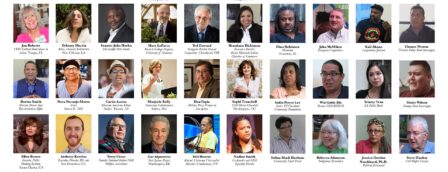
Gar Alperovitz is a political economist, change-agent, highly respected professor, much read author and a down to earth straight talking expert on what is happening in the New Economy. On my Road Trip Video Series, I interviewed him in his home in Washington DC on the New Economy. He speaks about an explosion of on the ground initiatives that have a powerful potential for addressing wealth inequity in this country. Video
In his newest book, What Then Must We Do: Straight Talk About the Next American Revolution, Gar challenges us to think differently about the future: He writes: “We remember the future. We unconsciously project forward assumptions about what is possible based on our actual experience of the past.” So, if we think nothing has really worked to change our economy for the better for working people in the past, we’ll think it is not possible now.
“We face systemic problems not simply political problems. We need to change the way things are rigged deeper down in the machinery of institutions, corporations, bureaucracy and all the other elements of the system that produce the outcomes we experience.” Politics won’t do that. As much as I want to hope that a new President and Congress will improve the wellbeing of people and communities, I agree with Gar–we need to address system change.
So, how do we begin to get a sense of what a better next system might entail? How do we begin to get from here to there? Gar replies: “We begin today with one bolt” and cites an inspiring story of how in the 1970’s one steelworker in a mill in Ohio that was about to close organized so that not only did that not happen, the workers ended up owning it. That initiative launched future changes that empower and benefit workers. Those changes include “many worker owned businesses in OH—a state that has established a support system for building them that is one of the best in the nation. In addition, the Employee Ownership Center at Kent State University provides assistance to workers and others to establish such firms. Now—after 30 years, even businessmen, many of whom aided by certain tax benefits sell their successful businesses to former employees when they retire.”
Worker Owned Cooperatives are an explicit part of the approach of a growing number of city governments to economic development. Evergreen Cooperatives is an example of worker owned cooperatives in Cleveland that are providing good livelihoods and futures for its worker owners and at the same time increasing community prosperity. Early partners were the mayor and the community foundation and the cooperatives’ success is linked to the capturing of the purchase power of anchor institutions like Cleveland Clinic, University Hospitals and Case Western Reserve University. Rochester NY and Richmond VA are also launching worker owned cooperatives based on the anchor model. There are 8 other cities using various approaches to build the population of worker owned cooperatives in their cities. Cities Developing Worker Co-ops: Efforts in Ten Cities
Gar is co-founder of the Democracy Collaborative based in Washington DC, a national research institute dedicated to developing new strategies for a more democratic economy. Their newest initiative is 50 by 50–50 million employee owners by 2050. The Collaborative believes: “The most promising worker owned cooperative efforts in cities often start with conversations that bring communities together to map the challenges they face, the assets they hold, and the vision they share.” To help you begin these conversations in your community the Collaborative has published: Jacksonville’s Community Wealth Building Roundtable, by Michelle Barth, details how a city-led convening unfolded in Jacksonville, Florida; and Sparking the conversation in your community, by Justine Porter, provides insights from a “Do-It-Yourself” convening process in Poughkeepsie, New York. Read more about these publications and the Collaborative’s Community Wealth Innovators Series.
If you are still wondering what you as an individual can do to help democratize wealth in this country, Gar has ten ways you can do that.
Jan Roberts is Founder & President of Cultural Innovations Agency, Inc.
